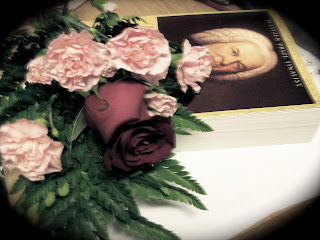As a budding organist, Bach is definitely one of my favorite composers. But not just as an organist do I say that. Having listened to an extensive amount of his music, I have found that I can honestly say that he is one of my favorite composers, whether organ, instrumental, or vocal. He is also my favorite composer because of the manner in which he conducted his life. Although there are many dedicated, disciplined musicians who composed beautiful music, not all of them showed that discipline in other areas of their lives. Bach, however, did. He has even been called the Fifth Evangelist because of his desire to compose his music for the glory of God, for the spreading of His Word, for the evangelization of the faithful. He was also a devout Lutheran, and a good father and husband. Thus, I hold him in special regard. Here is a small excerpt from this wonderful speech by Metropolitan Hilarion Alfeyev at the Catholic University of America, February 9, 2011.
Bach is a universal Christian phenomenon. His music transcends confessional boundaries; it is ecumenical in the original sense of the word, for it belongs to the world as a whole and to each citizen separately. We may call Bach an ‘orthodox’ composer in the original, literal sense of the Greek word ortho-doxos for throughout his life he learnt how to glorify God rightly. Invariably he adorned his musical manuscripts with the words Soli Deo Gloria (‘Glory to the One God’) or Jesu, juva (‘Help, O Jesus’). These expressions were for him not merely verbal formulae but a confession of faith that ran through all of his compositions. For Bach, music was worship of God. He was truly ‘catholic,’ again in the original understanding of the Greek word katholikos, meaning ‘universal,’ or ‘all-embracing,’ for he perceived the Church as a universal organism, as a common doxology directed towards God. Furthermore, he believed his music to be but a single voice in the cosmic choir that praises God’s glory. And of course, throughout his life Bach remained a true son of his native Lutheran Church. Albeit, as Albert Schweitzer noted, Bach’s true religion was not even orthodox Lutheranism but mysticism. His music is deeply mystical because it is based on an experience of prayer and ministry to God which transcends confessional boundaries and is the heritage of all humanity.
Bach’s personal religious experience was embodied in all of his works which, like holy icons, reflect the reality of human life but reveal it in an illumined and transfigured form.
Bach may have lived during the Baroque era, but his music did not succumb to the stylistic peculiarities of the time. As a composer, moreover, Bach developed in an antithetical direction to that taken by art in his day. His was an epoch characterized by culture’s headlong progression towards worldliness and humanism. Center stage became ever more occupied by the human person with his passions and vices, while less artistic space was reserved for God. Bach’s art was not ‘art’ in the conventional meaning of the word; it was not art for art’s sake. The cardinal difference between the art of antiquity and the Middle Ages on the one hand and modern art on the other is in the direction it takes: pre-Renaissance art was directed towards God, while modern art is orientated towards the human person. Bach stood at the frontier of these two inclinations, two world-views, two opposing concepts of art. And, of course, he remained a part of that culture which was rooted in tradition, in cult, in worship, in religion.
Monday, February 21, 2011
Sunday, February 13, 2011
Pride and Prejudice: A Series of Paintings
I have often marveled at how so many of the scenes from the 2003 film of Pride and Prejudice are so picturesque. Each one looks as if it ought to be a painting in a gallery. Here is a drawing that a friend of mine did of one of my favorite shots from the film, a thoughtful scene with Elizabeth Bennet. Well done, my dear! A lovely piece of art! I feel so blessed to have you as a friend!
Thursday, February 10, 2011
Meditative Moments in the Zentralfriedhoff, Vienna
This weekend I had the opportunity to go to the Central Cemetery, the largest cemetery in Vienna, Austria. It was a beautiful, meditative place, and it was the perfect day to go -blustery, with the sun flittering in and out of the clouds, playing with the lighting so it seemed like All Hollow's Eve in October.
 |
| Gazing heavenward |
 |
| The Central Cemetery in Vienna on a blustery February day. |
 |
| An Angel standing guard over one of the tomb stones |
 |
| A contemplative statue |
 |
| The Madonna and Child. Notice the fine curls on the angel on the left! |
Friday, February 4, 2011
The Floor of Heaven
... Look, how the floor of heaven
is thick inlaid with patines of bright gold:
There’s not the smallest orb which thou behold’st
But in his motion like an angel sings,
Still quiring to the young-eyed cherubins;
Such harmony is in immortal souls;
But, whilst this muddy vesture of decay
Doth grossly close it in, we cannot hear it.
An Excerpt from The Merchant of Venice
Hope and Strength
 |
| An statue from a grave in a cemetery in Salzburg |
 |
| A statue decorating the golden statue of our Lady in the platz in front of the Glockenspiel. |
Subscribe to:
Posts (Atom)


